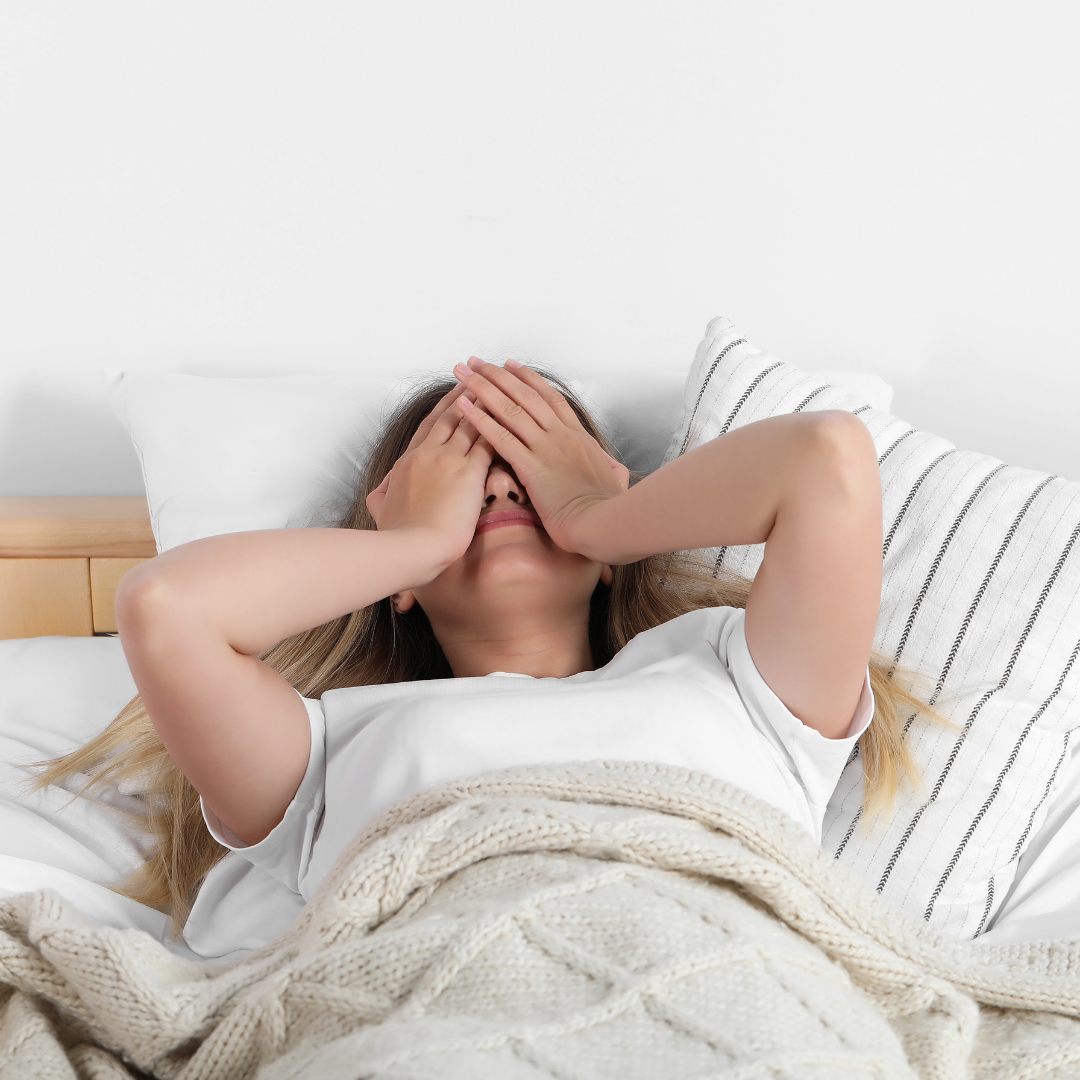
Menopause Fatigue – How To Boost Energy Levels
Ah, menopause fatigue – the pride and joy of any menopausal woman. (Can you sense the sarcasm here?)
Menopause fatigue is one of the most draining symptoms of menopause because it makes you so tired. Menopause tiredness can lead to poor mental health, increasing the severity and frequency of your other menopause symptoms and cause huge interruptions to daily life.
So, with that in mind, this article will deep-dive into menopause fatigue, answering all of the main questions like does menopause make you tired, what does menopause fatigue feel like and, most importantly, what can you do to fight against the fatigue.
Last Updated:
Does menopause make you tired?
Yes, menopause does make you tired.
But it’s not just about menopause tiredness. Menopause fatigue is a different ball game.
It’s normal for everybody to feel tired at times. From general stress to feeling overworked and burnt out, there are a whole range of factors that can cause every day tiredness. This can cause issues in personal lives and in the workplace.
That said, when it comes to menopause fatigue, it’s more like an unrelenting exhaustion that lasts a whole lot longer than normal. Plus, this exhaustion is far more intense and can’t be cured with rest.
So, the next time someone asks you does menopause make you tired, you can look them in the eye and say “no. It makes you completely fatigued.”
What causes menopause fatigue?
Menopause fatigue often beings in perimenopause – more aptly referred to as perimenopause fatigue – and it’s often because of fluctuating hormone levels.
When your hormone levels are out of whack and imbalanced, they can send alarms to the brain to wake up in the middle of the night and thereon.
On top of this, as your progesterone levels reduce, it can cause you to feel far more short-tempered and patient, making it more challenging to relax and fall asleep.
It’s suggested that certain hormones such as progesterone and oestrogen are meant to help women avoid a condition called sleep apnea.
Sleep apnea can vary in severity, but can be a pretty serious sleep disorder where your breathing stops and starts repeatedly.
So, when you enter perimenopause and menopause and your hormone levels lower, you’re not as protected from sleep apnea as you once were. If you develop sleep apnea during menopause or perimenopause, a key symptom is menopause fatigue.
Another reason why menopause makes you tired is down to your other symptoms, such as night sweats.
Night sweats are hot flashes but at night time. They are caused by changes in your brain which impacts your body’s natural thermostat.
What does menopause fatigue feel like?
Every single woman’s journey into menopause and beyond is unique and the way they encounter and experience fatigue is just as unique.
Your body and mind are going through huge shifts, changing what they’ve always done to something entirely new, which will cause you to experience menopause fatigue.
But what does menopause fatigue feel like specifically?
Well, for some women, they are too drained to do their daily tasks. For others, they’re too exhausted to attend social gatherings.
Essentially, your emotions, body and brain are all overworked and burnt out. So, when you’re dealing with menopause and fatigue it can be challenging just to function. Menopause and perimenopause fatigue can feel like:
- Feeling drowsy all day
- Craving salty foods
- Finding it difficult to get up in the morning
- Having a weaker grip
- Struggling to finish a task
- Finding it hard to concentrate and remember things
- Feeling more energised in the evening than in the morning
- Feeling unmotivated
- Tearing up easily, feeling emotionally overwhelmed and burnt-out
How common is menopause fatigue?
If you’re struggling with menopause tiredness, know that you’re not alone. In fact, in surveys, menopause fatigue consistently ranks as one of the more common symptoms.
In one particular survey of 3000 women over the age of 40, a huge 67% listed fatigue as one of the symptoms they were struggling with most.
Menopause fatigue – how to boost your energy levels
If menopause fatigue is making life difficult for you, there are things you can do to manage it.
1. Get moving with exercise
I know that exercise is probably the last thing you want to do when you’re knee-deep in menopause fatigue. Here’s the thing, though: exercise protects and strengthens your heart, muscles and bones.
And in terms of how it helps with menopause and perimenopause fatigue, exercise maintains and boosts your energy levels. Not to mention, it contributes towards your weight control methods in menopause and improves mood and general wellbeing.
Routine exercise can contribute towards a better sleep routine. That said, you should avoid doing exercise in the evening because it can make it harder to fall asleep.
Exercises that help with menopause tiredness include strength training, stretching and cardiovascular exercises. You should vary what you’re doing, but stay away from high impact exercises like running and jumping. High impact exercises can put too much pressure on your joints, and with joint pain being one of the core menopause and perimenopause symptoms, it’s best to be careful.

2. Stay hydrated
Hydration is so important for so many perimenopause and menopause symptoms, including itchy and dry skin, vaginal dryness and hot flashes.
As your oestrogen levels reduce, your body struggles to hold onto liquids, which can cause your cells to become dehydrated. This can lead to feeling drained and emotionally all over the place.
There’s a simple solution, though! Drink plenty of fluids throughout the day. You’re aiming for a minimum of eight glasses of water.
You should avoid fizzy and carbonated drinks, though, as the sugar levels can cause sugar highs and a crashing low. Kicking fizzy drinks to the curb is a super strategy against menopause tiredness.
If you’re desperate for sugary drinks or sugar in general, take a look at these foods that’ll kick sweet cravings to the curb.
3. If your BMI is high, work towards losing weight
Weight gain is another common perimenopause and menopause symptom.
Weight gain happens in menopause and perimenopause because of the lower levels of testosterone. This, in turn, impacts your body’s ability to transform fat into muscle. On top of this, lower oestrogen levels will boost the amount of fat around your stomach.
NHS states that a normal BMI range is 18.5 – 24.9, so if your BMI is higher, losing weight will help with your menopause fatigue.
4. Prioritise your own relaxation
As your progesterone levels, you might find that you struggle to remain as calm as usual. This is because progesterone helps with balance in terms of mood and panic. On top of this, progesterone, when reduced, can lead to a lower pain threshold.
That’s why, if you’re struggling with menopause tiredness, you should really prioritise relaxation and make time for it every single day.
Everyone is different, and what each woman finds relaxing is unique to them. For you, you might find yoga and meditation are great ways to unwind. Or, perhaps half an hour where you just write in a journal. If not, perhaps knitting. Whatever helps you decompress needs to be slotted into daily life.

5. Create a solid sleep routine (and stick to it)
Sleep is a tricky one in perimenopause and menopause because so many women find sleep disturbance the bane of their life until they reach the post-menopause stage.
A lack of sleep can lead to fatigue (shocker!) which can then cause a poorer quality of sleep. So, it can be a bit of a vicious cycle.
But there are ways to break the cycle.
Determine a healthy bed time and stick to it. You’d be surprised at how much better you’ll feel once you’re going to bed “on time.”
You’re going to want to put your phone away for at least an hour before going to sleep. Allow your brain the time it needs to unwind.
In this one hour, spend it on whatever you find relaxing. From bubble baths to reading, do something calming that allows you to unwind before hitting the hay.
To combat night sweats, wear lighter and more breathable clothing to bed. It’s worth keeping your windows open, too, and if you have a fan, stick that bad boy on.
Obviously, you should avoid consuming caffeine within 6 hours of your bed time.
6. Quit smoking
Quitting smoking is beneficial for general health and it will also help with your menopause fatigue.
Nicotine reduces the amount of oxygen that can flow to the organs, and can trigger both anxiety and stress. Anxiety and stress can wipe you out in terms of energy levels and make it more challenging to drift off into a decent sleep.
So, if you’ve been thinking about quitting smoking recently, here’s your sign to do it.
7. Avoid alcohol and caffeine
If menopause or perimenopause fatigue is making life tricky for you, it is well worth cutting out alcohol and caffeine.
If you don’t want to give up entirely, you should consider considerably cutting down on alcohol levels. Alcohol can cause low mood, anxiety and sleep disruption, particularly in perimenopause and menopause.
Caffeine can contribute to poor sleep quality and duration, too. Switch to decaf – you will 100% see a difference.
Menopause fatigue – in a nutshell
Menopause fatigue is extremely common at this stage of life. All the hormonal changes contribute towards this exhaustion, working in tandem to cause further symptoms that disrupt sleep such as night sweats, anxiety and muscle and joint pain.
Menopause tiredness can lead to low moods, emotional melt-downs and for your symptoms to become more severe.
Despite menopause and fatigue being so common in so many women’s lives, the vast majority of us just accept it and hope it’ll pass.
There’s no need to suffer in silence. From cutting out booze and caffeine to changing your diet and staying hydrated, implement the natural remedies for menopause fatigue outlined in this article.
We’re all tired when we enter perimenopause and menopause. Give someone you care about the gift of energy by sharing this article with them. They’ll be grateful, trust me.
Leave a Reply
- free ebook alert -
WHAT TO EXPECT WHEN YOU’RE
going through the menopause
Demystify your understanding of what’s happening to you. Arm yourself with solid, game-changing information to support you through this challenging phase of your life.
grab your copy now →
WHAT TO EXPECT WHEN YOU’RE
going through the menopause